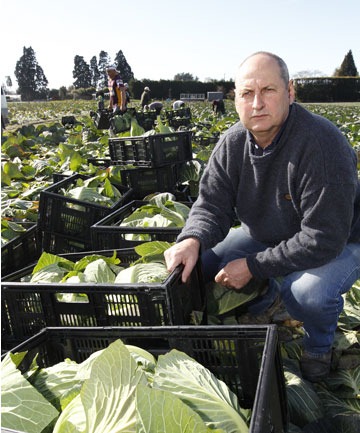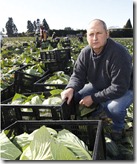Vegetable growing is becoming an increasingly hard row to hoe, say Nelson market gardeners.
Robbie Conning has been growing greens at Hope for 30 years and says the last three have been the most difficult he’s experienced.
Increasingly fickle weather, rising compliance and fuel costs and marketing strategies that favour bigger growers mean "it isn’t an easy business to be in at the moment".
But having recently bought another 16 hectares to add to the 85ha he already owns or leases and with a lot invested in machinery and a nursery, he’s committed to the long haul.
"Like any industry we have our ups and down, hopefully there’s a bright side ahead."
Murray Everett doesn’t share his optimism. After 20 years of growing much of Nelson’s broccoli as well as cabbages and cauliflowers in Paton Rd, he is seriously thinking of giving it up.
This season has been one of his worst and he’s had "a gutsful" of getting little or no return for his efforts. "I’m pretty brassed off and I think everyone else is feeling the same way."
He knows of at least one other grower also talking about giving up. "You have a big capital outlay and nothing to show for it."
Mr Everett, who supplies supermarkets throughout the South Island and lower North Island and employs up to 10 people at the peak of the season, says a warm autumn followed by a very wet spell was the final straw.
"Everything came on too fast and we lost a lot of it, then it swung round and got wet and cold and nothing is growing the same and there is a shortage."
Mark O’Connor, who for 13 years has managed Appleby Fresh, a family-owned operation on 120ha next to State Highway 60, agrees the season has been a real struggle and the vegetable trade is getting tougher.
For a business turning over millions a year, profitability is poor, he says, with some crops, such as lettuce, returning the same as they did 30 years ago when his father was growing.
He is one of the biggest Nelson growers producing 360,000 crates a year, yet he is small compared with major growers around Pukekohe, Gisborne. Horowhenua and Canterbury. Increasingly, it is an industry dominated by big players situated closer to the main markets who are able to benefit from economies of scale, he says.
Nearly all Appleby Fresh’s mainly leafy green produce is transported out of the region for sale mainly in the South Island and Wellington, unless there are shortages further north.
That costs a lot of money – up to 18 per cent of turnover Mr O’Connor says – and eats into already slim margins.
"Nelson is a good place to grow but it’s expensive."
Rising fuel prices, which feed into a range of other products from fertiliser to plastic, are adding to the squeeze.
On top of that is the rising cost of complying with stricter environmental standards involving softer sprays and fertilisers. Like most growers, Appleby Fresh is a member of Gap, an assurance quality programme requiring constant monitoring to ensure crops are safe and produced sustainably.
Then there are wage costs. Appleby Fresh has a permanent work force of about 35, many of them hardworking Thai and Burmese refugees, which grows to 55 when corn and melons need picking. Mr O’Connor says the Recognised Seasonal Employer scheme – which allows him to bring in workers from the Pacific Islands to help out – has been a godsend by providing a reliable and affordable labour supply.
The cost and availability of water is another worry, given that market gardeners are big irrigators and most summers there is rationing on the Waimea Plains.
Mr O’Connor is a strong supporter of the proposed Lee Valley dam, saying its ongoing benefits to the region through increased production will far outweigh the $41 million cost of the project.
"It will allow us to expand and give us the security of putting in crops knowing they will be ready when you want them to be."
As well as helping future proof the business, a guaranteed water supply will reduce big swings in vegetable prices over summer and lead to more jobs, he says.
But he remains worried that a strict user-pays approach to funding the dam will backfire by leading to a lower buy-in from smaller users and forcing up the cost to others. Big contributions will be needed from central and local government to make the scheme affordable, Mr O’Connor argues.
In the meantime, it’s a matter of soldiering on doing what he still enjoys – "growing good product".
"Even though we don’t make a huge amount of money, it provides employment for the family and a lot of others."
Having his two brothers, two sons and three other family members involved in running the business made for some lively debate, "but I think we’re a pretty well run company".
http://www.stuff.co.nz/business/farming/5414435/Vege-growing-getting-harder?


Deprecated: strpos(): Passing null to parameter #1 ($haystack) of type string is deprecated in /home/agriviek8Qv/agriviet.net/public_html/wp-includes/comment-template.php on line 2522